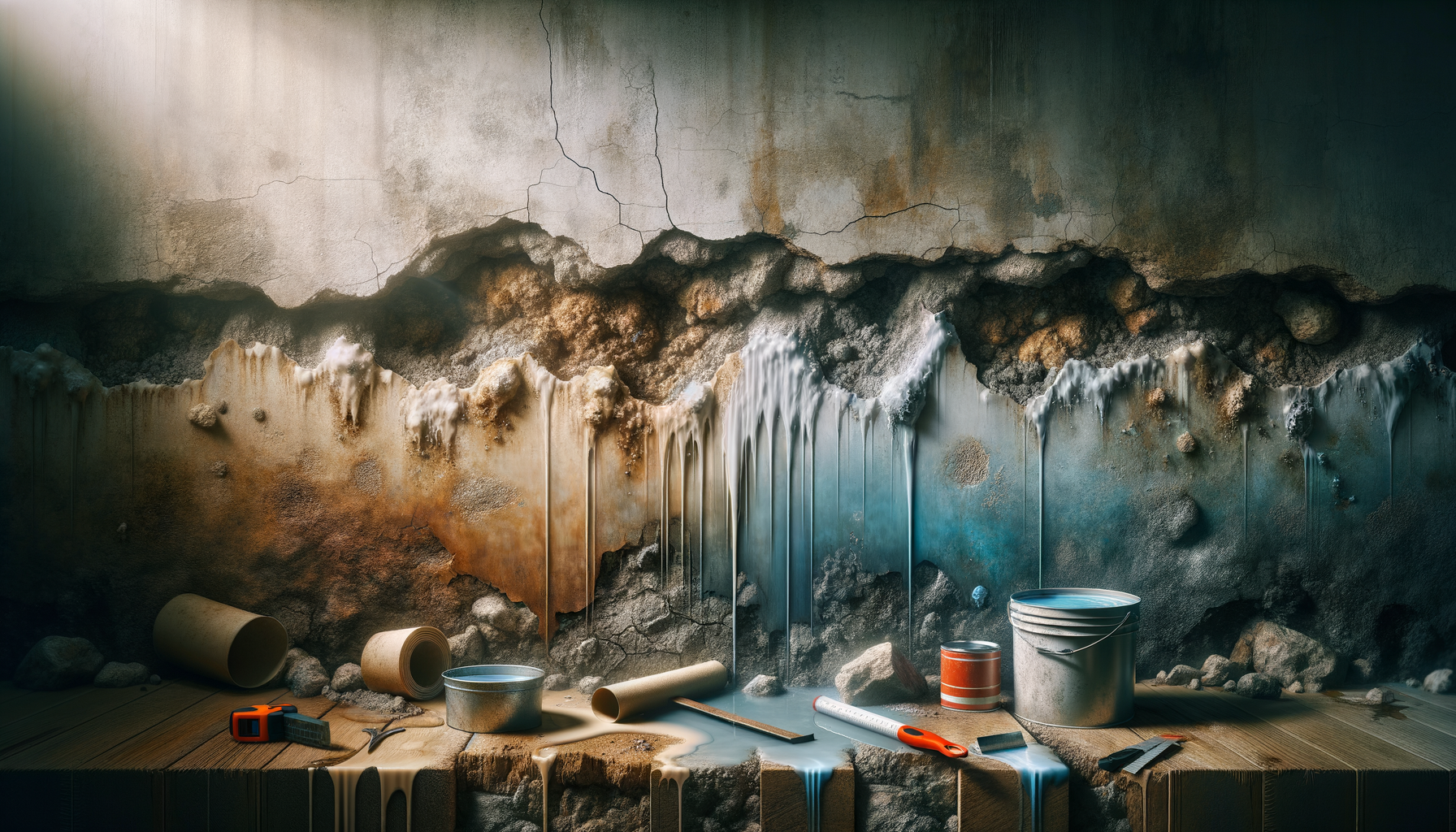Water leaks in basement walls can be really stressful for homeowners. This guide will help you see the signs, understand what causes the leaks, and take steps to fix and prevent water leaks in your basement.
Understanding Water Leaks in Basement Walls
Identifying the Problem
Water leaks in basement walls can show up in different ways. Here are some signs to look for:
- Damp spots on walls: Even small damp spots can be a big problem.
- Peeling paint: Water can make the paint on your walls peel.
- Efflorescence: This is a white, chalky stuff on the walls that shows moisture is getting through.
- Musty odor: A musty smell often means mold, which grows in damp places.
- Visible mold growth: Mold means there’s too much moisture and can be bad for health.
Common Causes of Water Leaks in Basement Walls
External Issues
- Poor Grading and Groundwater: If the ground around your home slopes towards the house, water can gather and seep into the basement.
- Faulty or Clogged Gutters and Downspouts: If gutters and downspouts don’t drain water right, they can overflow and make the ground near your house too wet.
- Cracks in Foundation Walls: Even small cracks can let water in.
Internal Problems
- Plumbing Leaks: Leaky pipes can cause long-term moisture trouble.
- High Indoor Humidity: Too much humidity can make condensation on basement walls, making them damp.
Steps to Address Water Leaks in Basement Walls
Inspection and Detection
- Visual Inspection: Look for signs of water damage and dampness.
- Professional Assessment: Think about hiring a pro for a thorough check.
Temporary Fixes
- DIY Waterproofing Paint: Putting waterproof paint can temporarily keep moisture out.
- Using Dehumidifiers: Dehumidifiers help manage indoor humidity.
- Applying Epoxy to Small Cracks: Epoxy can temporarily seal small cracks.
Permanent Solutions
- Exterior Waterproofing: This keeps water away from your foundation by adding a water barrier on the outside walls.
- Interior Drainage Systems: Installing a drainage system inside can help redirect water.
- Foundation Crack Repair (Injection Method): Using epoxy or polyurethane injections can seal cracks well.
- French Drains Installation: These drains help keep water away from your foundation.
Prevention Tips to Keep Your Basement Dry
Regular Maintenance
- Clean Gutters and Downspouts: Ensure they drain water properly by cleaning them often.
- Check Grading Around Your Home: Make sure the ground slopes away from the foundation.
Basement Precautions
- Use a Dehumidifier Regularly: This keeps humidity levels low.
- Install a Sump Pump: It helps deal with excess water in the basement.
- Apply Waterproof Sealant: It provides extra protection on your basement walls.
Landscaping Considerations
- Plant Trees and Shrubs at a Distance: Roots can mess with the foundation and drainage system.
- Ensure Proper Slope Away from Foundation: Good landscaping keeps water away from your home.
Frequently Asked Questions (FAQ)
Why is there white residue on my basement walls?
- Explanation of Efflorescence: Efflorescence happens when water carries minerals through the wall and then evaporates, leaving white residue behind.
How can I tell if a crack is serious?
- Assessing Crack Size and Location: Small cracks are usually less of a worry, but big or growing cracks should be checked by a professional.
What should I do if my DIY fixes don’t work?
- Importance of Seeking Professional Help: If problems keep happening, call a professional to stop long-term damage.
When to Call a Professional
Situations Warranting Professional Intervention
- Widespread Mold: Big mold problems need professional help.
- Persistent Leaks Despite Efforts: If leaks keep happening, there may be a deeper issue.
- Visible Structural Damage: Any sign of structural damage needs professional attention.
Choosing the Right Contractor
- Checking Credentials and Reviews: Make sure the contractor is licensed and has good reviews.
- Asking the Right Questions: Ask about their experience, methods, and guarantees.
Final Thoughts on Water Leaks in Basement Walls
Emphasize Maintenance
Regular checks and prevention help keep your basement dry.
Encourage Professional Consultation
For safe and lasting fixes, don’t hesitate to get professional help when needed.
By following the tips in this guide, you can fix and prevent water leaks in your basement walls, keeping your home safe and dry.
SEO Keywords:
- Water leak in basement wall
- Basement waterproofing
- Foundation crack repair
- Prevent basement leaks
- Mold in basement


Leave a Reply